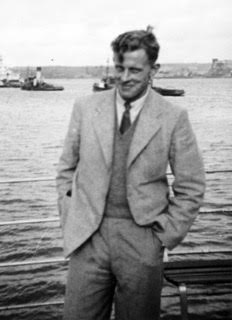Obituary: Bernard Quinn (1926-2010)
This blog, as I write elsewhere, is a kind of museum in cyberspace
covering mainly news and features relating to Budleigh Salterton and the
surrounding villages of the Lower Otter Valley.
Inevitably it’s turning out to be a useful
archive for people wanting to stage exhibitions at Fairlynch Museum, or simply to fill gaps in research, with that
useful search engine box in the top left corner.
So I was a bit
put out to discover that somehow I hadn’t included the following appreciation of
the life of Museum volunteer Bernard Quinn, although it was published on the
Devon Museums’ Fairlynch site on 2 February 2012.
Well, I can’t
get everything right. Anyway, here's the missing post:
Although
some years have passed now since his death at the age of 84, on 9 April 2010,
Bernard Quinn, pictured above, is well remembered at Fairlynch for the cheerful
and friendly approach with which he greeted visitors and fellow-volunteers, as
well as for his spirit of dedication to the Museum. Sam Richards, a
former colleague and his closest friend writes:
Bernard Quinn came from the Birkenhead
area which he left to serve in the Royal Navy in the mid 1940s. Following his
service period during World War Two he worked for some time in the Civil
Service but the wanderlust, no doubt nurtured during his naval years, led him
to find employment in what was then described as a 'West African Merchant
House' in the early 1950s.
The company was one of the lesser
known Unilever operations. Whilst it was unknown in the UK it was in fact one
of the largest companies operating in Nigeria, the Gold Coast and Sierra Leone
and was called G.B. Ollivant Ltd, part of the United Africa group of Unilever.
Bernard spent some time as a manager, mainly in Eastern Nigeria based in Port Harcourt,
and performed in various capacities.
For a while, for example, he used to tour
the region visiting various villages with a large metal box full of money to
pay farmers for their palm oil kernels which the company shipped back to the UK
for Unilever's soap industry. The import side of the business covered a very
wide range of merchandise such as foodstuffs, drinks, perfumes, medicines and a
very wide range of hardware such as tools, enamelware, agriculture equipment
and fishing materials.
Unfortunately in the 1960s Bernard
fell ill with mysterious intestinal problems and the company repatriated him to
the UK. He spent time in London hospitals then in Manchester. His condition was
intermittent and lasted for some years. Eventually the problem was correctly
diagnosed in the Manchester Royal Infirmary and there what proved to be the
last of several operations was successful although it did leave him with his
diabetic condition for the rest of his life. It is fair to say he was a walking
miracle because the operation had been 'A First'.
Since this health problem was
intermittent for much of the time he was able to lead a normal life and the
company, G.B.Ollivant Ltd, employed him as a Buying Manager in the head office
in Manchester where we worked as colleagues because I held the same position.
On holiday with a friend
Before moving to Green Mews in Budleigh
Salterton on his retirement, he and Hilma had lived in Sale near Manchester and
then Marple, Cheshire in an attractive flat roofed bungalow with a garden area
so large they found a horse wandering around in it one day.
Bernard was a private man and never
really spoke about himself or his family. However, without ever prying, he was
a very good listener and made everyone he talked to feel they had told him
something very interesting. He had a keen sense of humour and an inquisitive
nature regarding a wide range of subjects, including world affairs.
Since our retirements to separate
parts of the UK, we only visited each
other three or four times a year but I do miss him, his enquiring mind and his
ready smile.





Comments
Post a Comment